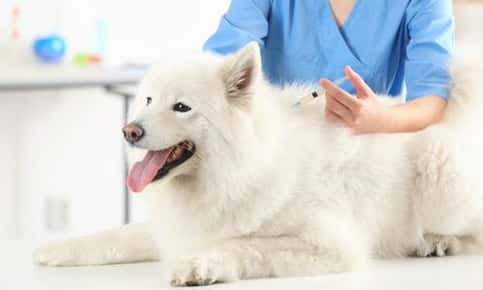
Which Vaccines Are Essential For Your Pet?
Concerns about potential side effects and the cumulative effects of vaccines may make you wonder if immunizations are really necessary. Although your pet can probably skip some vaccines, others are absolutely essential for good health and disease prevention.
Why Vaccines Are Important
Vaccines boost your pet's immunity and prevent him or her from developing serious diseases and illnesses, including rabies and distemper. Vaccines contain small amounts of weakened or killed viruses. After your pet receives the vaccine, he or she will develop antibodies to the disease. If your dog, cat or ferret is exposed to the virus in the future, the antibodies will quickly kill and attack the virus, preventing your pet from becoming ill.
Vaccines not only safeguard your pet's health but also protect animals that are too young to receive vaccinations or can't receive them due to certain health conditions. Vaccination slows or stops the spread of disease, keeping pets, and sometimes, people safe.
Before the rabies vaccine was introduced, pets and humans exposed to the virus faced certain death. Thanks to the vaccine, untold numbers of lives have been saved since it was introduced in the late 1800s. Unfortunately, rabies still kills thousands of people and animals a year in parts of the world where vaccinations are uncommon.
Which Vaccines Do My Pets Need?
Dogs, cats, and ferrets are vaccinated against the diseases most likely to affect them. Vaccines are grouped into two categories: core and non-core. Core vaccines prevent your pet from diseases most likely to occur where you live. Non-core vaccines are optional vaccines that could be needed depending on your pet's risk factors.
Core vaccines for dogs include:
- Adenovirus-2 (Adenovirus and hepatitis)
- Distemper
- Parvovirus
- Rabies
Is Lyme disease widespread in your area? Your dog may benefit from a non-core Lyme disease vaccination. Other non-core vaccines include bordetella (kennel cough), coronavirus, leptospirosis, and canine influenza.
Your cat will need these core vaccines:
- Distemper
- Feline Calicivirus
- Feline Herpesvirus Type 1
- Rabies
Feline immunodeficiency virus, feline leukemia, bordetella, and chlamydophila felis vaccines are non-core vaccines that may be recommended for some cats. For example, your veterinarian may suggest the feline leukemia vaccine if your pet spends times outdoors where he or she may be exposed to cats with the virus.
Core vaccines are given when your pet is a puppy or kitten, although they can also be given to adult pets that haven't received them yet. Some vaccines need to be repeated every year, while others are effective for three years or longer. The rabies vaccine schedule varies depending on the laws in your area.
Ferrets receive distemper and rabies vaccines, but there are no non-core vaccines for these animals.
What About Side Effects?
Side effects can occur after vaccination, but most are mild and only last for a day or two. Common side effects may include mild fever, pain around the injection site, lethargy, reduced appetite, coughing, and sneezing.
Call your pet's veterinarian immediately if your companion experiences nausea or vomiting, hives, trouble breathing, severe coughing or swelling around the face, eyes or nose.
Fortunately, most animals have only mild side effects after receiving vaccines. The temporary discomfort of side effects far outweighs the potentially devastating consequences should your pet develop rabies, distemper, parvovirus or other serious diseases.
Is it time for your pet's vaccinations? Contact us to schedule your furry friend's appointment.
Sources:
ASPCA: Vaccinations for Your Pet
https://www.aspca.org/pet-care/general-pet-care/vaccinations-your-pet
Consumer Reports: Why It’s So Important to Vaccinate Your Dog, 9/17/18
https://www.consumerreports.org/pets/why-its-so-important-to-vaccinate-your-dog/
Centers for Disease Control and Prevention: Is Rabies in Your State?
https://www.cdc.gov/rabies/location/usa/surveillance/index.html
Canine Journal: Which Dog Vaccinations Are Necessary?, 6/21/19
https://www.caninejournal.com/dog-vaccinations/
Merck Manual: Management of Ferrets
https://www.merckvetmanual.com/exotic-and-laboratory-animals/ferrets/management-of-ferrets
American Humane: Vaccinating Your Pet
https://www.americanhumane.org/fact-sheet/vaccinating-your-pet/
